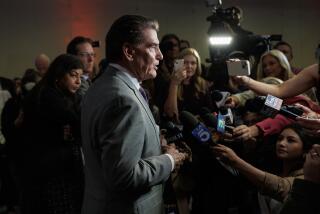John Edwards’ legal team opens defense
- Share via
GREENSBORO, N.C. — After weeks of riveting and often salacious testimony about an extramarital affair and the elaborate lies that once kept it hidden, testimony in the John Edwards trial turned Monday to a more prosaic topic: campaign finance law.
As Edwards’ legal team opened his defense, the finance director for his failed 2008 presidential run testified that more than $900,000 from two wealthy benefactors was not reported as campaign contributions because it represented private gifts intended for personal expenditures.
Lora Haggard, who supervised reporting to the Federal Election Commission, said the FEC told the Edwards campaign it was not required to report the money on campaign finance reports. The commission maintained this position, she said, even after the former senator was indicted last June.
Federal prosecutors have charged Edwards with six counts of violating campaign finance laws. One count alleges that he conspired to “falsify, conceal and cover up by trick, scheme and device” campaign finance reports. Edwards, 58, faces up to 30 years in jail and $1.5 million in fines if convicted on all charges.
The government says checks from heiress Rachel “Bunny” Mellon and late Texas lawyer Fred Baron were campaign contributions intended to influence the 2008 presidential race by concealing Edwards’ affair with Rielle Hunter and hiding the daughter born to the couple. The defense says the money constituted private gifts intended to conceal the child and the ongoing affair from the candidate’s cancer-stricken wife, Elizabeth Edwards.
Haggard was asked by Edwards’ lead attorney, Abbe Lowell, whether the candidate had attempted to “trick” her or otherwise influence her reporting to the FEC. She replied firmly, “No, he did not.”
In fact, Haggard testified, Edwards was not involved in assembling, preparing or filing campaign finance reports. “He had no input,” she said.
Prosecutors objected several times during Haggard’s testimony, arguing outside the jury’s presence that the FEC opinion was “an end run” irrelevant to the Edwards criminal case. They told U.S. District Court Judge Catherine Eagles that the court and jury, not a defense witness, should decide the matter.
They won a victory when Eagles said she would sharply limit upcoming testimony from former FEC Chairman Scott Thomas. With the jury out of the courtroom, Thomas went through his testimony before the judge, saying the money donated by Mellon and Baron did not qualify as campaign contributions.
Eagles ruled that Thomas would not be permitted to repeat the statement in front of the jury.
Haggard was followed by defense witness Harrison Hickman, an avuncular polling consultant on three Edwards campaigns, including the one in 2008. His windy discourses on polling techniques and insider political maneuvers tried the judge’s patience at times. “Too much detail,” Eagles snapped at one point. One juror rested his head against a wall and closed his eyes as Hickman testified.
The defense tried to show that — because Hickman told Edwards in November 2007 that he had little chance of winning the nomination — the campaign had little motivation to cover up the affair to preserve Edwards’ candidacy.
But prosecutors elicited acknowledgment from Hickman that, although he continued into early 2008 to tell Edwards that his chances were poor, he maintained a positive, upbeat outlook in emails and comments to campaign staffers.
Asked why, Hickman replied, “People were desperate for good news at that point.”
Hickman testified that it was Baron’s idea to funnel money to Edwards’ once-trusted aide Andrew Young to help Young and Edwards’ mistress escape tabloid scrutiny.
“Their lives were disrupted by the paparazzi.... They were jumping through windows and things,” Hickman said, paraphrasing Baron.
Baron, a prolific Democratic fundraiser who died in October 2008, said he intended to pay gift tax on the money he sent to Young, Hickman testified.
Hickman described a central role played by Elizabeth Edwards in the 2008 campaign, even after her suspicions about her husband were seemingly confirmed by two National Enquirer articles. Edwards, who died of cancer in December 2010, wanted her husband to continue to pursue the Democratic nomination, according to Hickman.
Asked about Elizabeth Edwards’ reaction to the Enquirer exposes, Hickman replied, “It was volcanic.” He added, “She kept saying, ‘I don’t want to be humiliated. I don’t want my children to have to deal with this.’”
Testimony resumes Tuesday; the trial is expected to last at least through next week.
More to Read
Sign up for Essential California
The most important California stories and recommendations in your inbox every morning.
You may occasionally receive promotional content from the Los Angeles Times.














